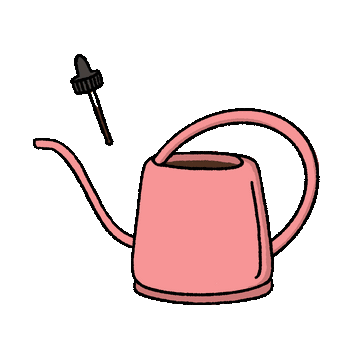Another winter is upon us, and while it does bring a number of positives (us pale gingers can go outside again for one...), for our indoor plants it can be a fairly taxing season. We've covered in previous years the best way to prepare your plants for the oncoming cold, so this year we thought it would be good to highlight a few of the most common winter plant mistakes to avoid.
Like many of our posts, this content comes from experience so if we can help one or two plants get through this winter unscathed then we're cheering!
Mistake One: Overwatering
You must have known this would be on the list right? And you would be very much forgiven if this is something you have a tendency to do come winter time. It's easy to get into a watering routine. You know your plants, you did all the right things initially - stuck your finger in the soil before each water, learned their drinking habits... - then just when you get comfortable the temperature drops and their water requirements change. Meanwhile you're still in the zone watering like the absolute LEGEND you are, and before you know it leaf tips start to brown. This is super common.
We have a schedule over the warmer months when our plants are actively growing, but when the slide into dormancy over winter we forget to adjust our watering routine.
Best tip to avoid this, is go back to sticking your fingers in the top of the potting mix with each seasonal change. That way you can get an idea of how thirsty your plants are and how their needs are changing, plus you'll avoid making our #1 Winter Mistake.
Mistake Two: Over fertilising
Very similar vibes to mistake one here. As our plants slip into dormancy* with the cooler weather, they're going to need less nutrients. If you're using a synthetic, high NPK liquid fertiliser over Spring and Summer, then reduce your fertilising frequency (once every 6-8 weeks is fine) and even think about feeding at half strength.
Alternatively, lower NPK, slow release organic fertilisers can be a great option to ensure your plants are provided for without the risk of over fertilising.
Mistake Three: Cranking that Heater
Well, the heater-cranking isn't the mistake here but forgetting about your plant proximity to said heater is. Many of us haven't touched our heating units over the past six or so months and we've potentially used that prime real estate for plant placement. Being too close to a heater (and this includes fireplaces and aircon and especially space heaters) can cause plants to dry out. Ensuring no plant is within 1.5m of a heat source is advised if you wish to avoid those crispy leaves.
But its not just the proximity to the source you need to worry about - frequent use of heaters can dry out the air leaving your plant fam dehydrated and desperate for some humidity. Our favourite trick here is to group plants a little closer together, or place them on a tray of pebbles filled with water (just make sure the pebbles are keeping the pot dry!), or even grabbing a terrarium.
Mistake Four: Not shifting with the Sun
This is another one of those, "do as I say, not as I do" type mistakes, and the degree to which you (need to) avoid this mistake will vary depending on the light levels in your home. Come Winter time, we less light throughout the day, and that light is now coming into our homes on a different angle than before.
When plants do not receive adequate light their foliage can turn yellow and their growth can become 'leggy' and they appear less full. Moving your plants to work with the new light conditions will help avoid any disasters. Alternatively, hook yourself up with a grow light. These can help maintain consistent light year-round and will relieve the stress of the winter changes.
Mistake Five: Relaxing that cleaning routine
You've been nailing that plant care routine all summer, don't let it slip now! Cleaning foliage is important no matter what time of year it is. Plants need clean foliage to maximise their ability to photosynthesise, even more important when light levels have reduced. In Winter, colder temperatures, increased rain and just general 'indoor cosy vibes' see us spending more time indoors. Dust in our homes increases with activity, so dust levels in the home (and on our plants!) will naturally increase. You might even need to to step up your cleaning routine - best test is the old finger swipe: running your finger across the foliage. If there is dust on your finger, the grab yourself some neem and give it a clean!
Hope this helps your plant fam get through the upcoming cold. As always, if you have any tips or other mistakes I've missed, hit us up in the comments!
* this is not true for every plant and every home. Under the right conditions, your plants may continue to grow year-round. If this is the case, just keep doing what you're doing! Active growth (plants still pushing out new foliage) is a sign dormancy hasn't occurred in which case you won't need to adjust your fertilising and watering as much.



Leave a comment